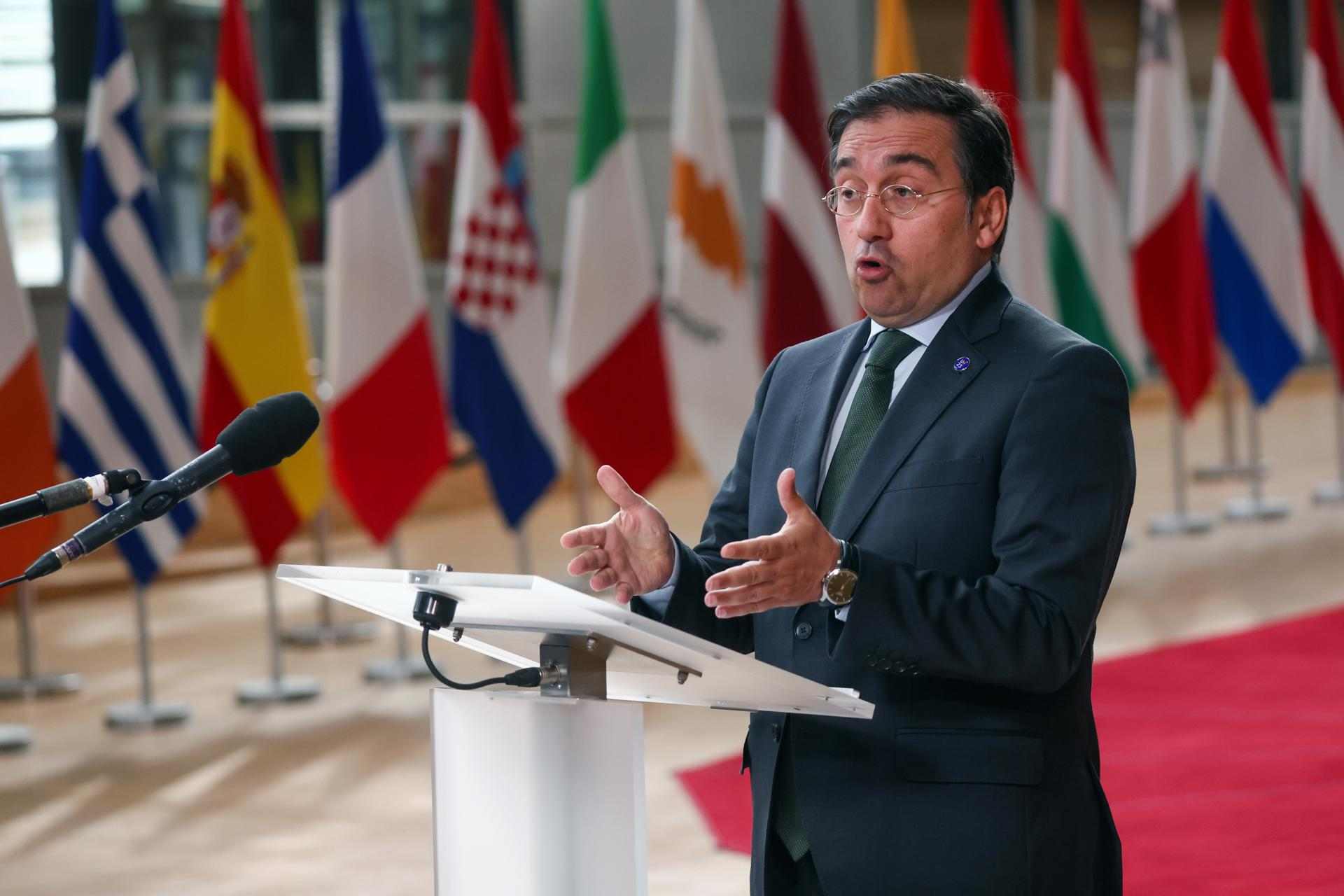The acting Spanish government has taken a knock-back in its battle to obtain official EU status for the Catalan language. It hasn't obtained a favourable outcome, but the issue is still alive. Aware that, for the Spanish Socialists (PSOE), the ability to form a new government is also in play, the foreign minister, José Manuel Albares, made an enthusiastic defence of the officiality of the language before the General Affairs meeting of the Council of the EU this Tuesday. He maintained his stance even after learning that some of the representatives of the 27 states of the Union had reiterated their misgivings at the gates of the meeting. In fact, the minister's pursuit of the goal was so determined that he has even given up on achieving the official status for Galician and Basque at the same time. He said after the meeting that some voices had warned that adding three new languages all at once was excessive, and he set out a gradual proposal that would first allow the use of Catalan among the Union's official languages, justifying the priority by the 10 million speakers that make up the Catalan language community. With this, Albares has survived the first round, and was able to claim that he had fulfilled the commitment he had made, in the context of the quest to form a new Spanish government after the July 23rd election, to Together for Catalonia (Junts). But he still has two further General Affairs meetings before a hypothetical debate on Sánchez's investiture. The minister has scheduled further EU meetings on October 24th and November 15th. And now, with the Basque and Galician parties upset.
Official status for Catalan in Europe - and in Congress - was the demand made by Junts in return for voting for Francina Armengol as speaker of the lower house. Failure to meet this commitment could leave the negotiations for the investiture in a tight spot. "This is not enough and the Spanish state knows it", warned Carles Puigdemont in a tweet, stressing that although there had never been so much progress, "there is work to be done". The Junts leader warned that the path that has been started must be irreversible "and without having to wait too long".
However, diplomatic sources affirm that Spain does not want to take another gamble by presenting the proposal on language officiality to the Council unless it has support guaranteed. In addition, they underline the difficulties that the Socialist executive will face in securing the support of countries such as Sweden and Finland, with conservative governments and the presence of the extreme right, while the possibility of a PP government in Spain remains. However, Junts has made clear its mistrust of Sánchez and is demanding that commitments be fulfilled in advance, before committing to support an investiture.
Ill-feeling among the Basques and Galicians
Nevertheless, Carles Puigdemont's party did recognize the defence of Catalan which Albares made; it appreciates that the process to achieve official status has been set in motion; and, especially, the fact that it has opted for a gradual proposal that will open the door of the EU in the first place to Catalan, which will speed up the procedure, according to Albares. The minister argued that Catalan is the language that has made this claim most insistently and the one with the largest number of speakers, in fact, being among the fifteen most widely spoken languages in Europe. In addition, Catalan is already the official language of Andorra, a European country that, despite not being part of the EU, is negotiating an association treaty.
This has, however, led to the opening of a new front of conflict for the PSOE, with critiques from Basque parties Bildu and the PNV, as well as from the Galician sovereignists, the BNG, when the votes of these three parties are all essential for Sánchez to be invested as prime minister. The undersecretary Pascual Navarro avoided delving into this issue in the press conference he offered at the end of the meeting, so as not to inflame the mood any further. Nor did he specify which countries were the ones that, as the minister had said, expressed misgivings about the fact that there were three languages seeking officiality at once. In fact, one of the ministers present at the meeting questioned in the corridors of the Council whether anyone had taken a position on that point. He affirmed that he did not remember it and stated that the main obstacles to the officialization of the three languages are economic and the precedent that would be set with this decision.
Legal doubts dispelled
Meanwhile, in Catalonia it has been noted that the Spanish government has deactivated the legal reticences that the European legal services mentioned when Spain proposed official status for Catalan in 2005. This Tuesday the Spanish minister responded to that report by referring to article 25.2 of the Treaty, which endorses translations in languages considered official in the respective territories. As for the doubts caused by the cost that this proposal may entail, Spain has guaranteed that it will bear the costs, just as it has done since 2005.
However, the decision to postpone the official vote was criticized by the Catalan government. The spokesperson for the Catalan executive, Patrícia Plaja, complained that the Spanish executive had "the duty and the means to get the Council of the EU to put an end to the democratic anomaly of Catalan not yet being an language official in the European institutions". "They did the work badly, late and in a hurry," she concluded. For her part, the Catalan foreign minister, Meritxell Serret, warned that her executive will carry on watching this issue with "maximum ambition and maximum demands".

